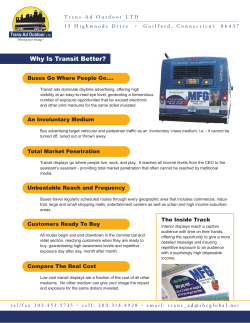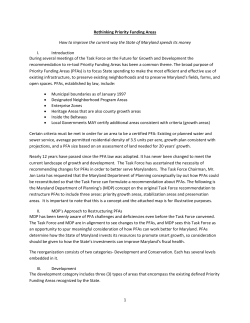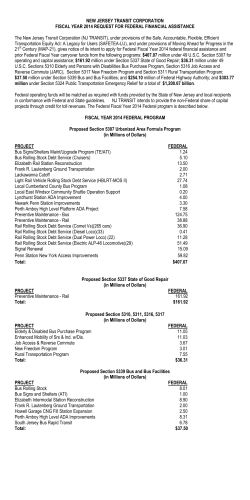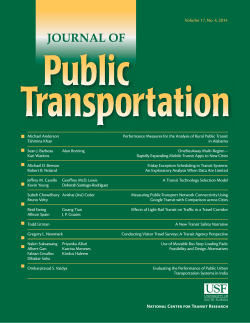
Document 365303
Transit Action Network Website: http://TransActionKC.com Email: [email protected] Twitter: www.twitter.com/transactionkc Facebook: www.Facebook.com/TransitActionNetwork Online Transit Forum – Candidates for Johnson County Commission Transit Action Network asked all of the candidates running for office on the Johnson County Commission to answer questions about transit to help voters understand their positions on this critical issue. We appreciate candidates talking the time to respond to our questionnaire and sharing their philosophy, vision and ideas on transit. Be sure to send this article to residents of Johnson County so they can be informed about the candidates’ positions. The answers per district are given in the order TAN received them. We do not endorse a particular candidate but believe voters should be well-informed as to candidates’ knowledge of the subject and their positions. Michael Ashcraft, incumbent for Commissioner of District 5, is running unopposed and he declined to participate. TRANSIT ACTION NETWORK ONLINE TRANSIT FORUM – October 2014 1. Broadening the Focus of The JO Johnson County has very successfully increased jobs in the county, yet access to these jobs by public transit is extremely poor since The JO, a commuter service, only concentrates on taking people to jobs in downtown Kansas City. What is your commitment to increasing access to Johnson County jobs using The JO? County Commissioner, Chair Ed Eilert - I anticipate that the new agreement with ATA will increase the opportunity for route connectivity within the metro. This should provide a wider range of transit options. Patricia Lightner - The county needs to work to find the best solution to any transit issues including how to find ways to get people to their jobs without such a low ridership. I would work to explore all alternatives in solving this issue and making it feasible to the county budget. County Commissioner, 1st District Laura McConwell - We know as our demographics are changing and that transportation options become more important. We need to continue to find ways to make transit more reliable to for those living in Johnson County who need to get to work in Johnson County. Ron Shaffer - Johnson County’s recent decision to allocate matching funds for a regional plan will help to double transit access over the next ten years. I am on the Board of Mid America Regional Council (MARC) which is overseeing and coordinating the plan to improve transit access to Johnson County Jobs. Also, as our cities become more walk-able and bike friendly, we are seeing a regreening in the first tier suburban cities which comprise the northern portion of the First District. Not only do we need to provide transit for workers in our neighborhoods, but also for seniors, disadvantaged, disabled and those living in poverty. These vulnerable citizens need the community to gather together to provide access to transportation so they can succeed. A cost effective increase in transit access hubs at employment centers, and at central and coordinated locations will be the first step towards more transit friendly neighborhoods, which in turn makes Johnson County more attractive as a resource for more jobs, benefitting the entire region. County Commissioner, 4th District Curt Skoog - The JO will become successful in the communities eyes when it connects people to the places they want to go. In the past, that was to Downtown KC. Tomorrow it will be down the street and across the metro to their work, schools, doctors and restaurants. This was demonstrated during the development of the Vision Metcalf Plan, residents, property owners and business owners overwhelmingly supported including transit on Metcalf. Due to this plan, which was approved by the Overland Park City Council, staff was able to secure federal funding to build modern transit stops and other transit infrastructure on Metcalf. I will continue to be committed to the Vision Metcalf Plan including its transit recommendations. Jason Osterhaus - Over the last 4 years we have implemented many options that have increased access to Johnson County jobs, from maximizing routes to get more people to business', to the addition of the Mission transit center and many of the other additions that the TIGER grants made possible. I will continue with that commitment. 2. Implementing Johnson County Transit Plans Young adults, Millennials, are leaving Johnson County to be car-free in Kansas City. Demographics are changing and poverty levels are rising in Johnson County. These trends create the need for a more extensive transit service. How soon do you plan to fully implement Johnson County Transit's Strategic Plan and the START (Strategic Transit Action Recommendation Taskforce) recommendations to use public transit to improve access to jobs, shopping and entertainment, and create mobility improvements? County Commissioner, Chair Eilert - I do not see full implementation of the START recommendations in the near future. I have suggested that as development or re-development is planned along or near transit routes and if tax incentives are used to support those activities, that a portion of those incentives be used to support transit activities. Lightner - I am not currently familiar with this program and would need to study to provide any comment. County Commissioner, 1st District McConwell - Johnson County Transit’s Strategic Plan has not been updated since 2011 and START’s recommendation seem to be stalled. It is vital that we update our Plan and create a long term plan for the growth and density that is coming as our county ages and poverty increases. Additionally, the younger members of our community are seeking transportation options. This will allow us to make prudent investments. We needed to be committed for the long term. Shaffer - While Millennials may be leaving Johnson County to be car-free, we are also seeing the Gen-Y’ers who are now moving back to the suburbs to raise their families. Thusly, we are welcoming the re-greening of our first tier suburban cities by assisting our new neighbors in their demands for more walk-able cities, bike-able trails as well as public transportation. The County’s strategic plan calls for a reliable and predictable dedicated funding stream for transit issues. However we need to balance infrastructure, parks, sidewalks, and streets with the need for effective public transit. I support the County leader’s decision to help form the Regional Transit Coordinating Council that is working with all the regions transit agencies to improve coordination of services and passenger convenience. Striking a balance of budget cuts, revenue projections and recovering economy will allow us to prioritize our public transit investments as soon as practical. County Commissioner, 4th District Skoog - The Metcalf Corridor is the perfect location to start the transition of the JO from a commuter service to a connector service for the following reasons: 1. College and Metcalf is the center of the largest concentration of jobs in Johnson County. 2. The pending redevelopment of Metcalf South and other older retail centers will bring higher density of people and jobs to The Corridor. 3. It enables the connection of multiple other destinations including downtown Overland Park, 119th and Metcalf, Mission and The Plaza. 4. The transit infrastructure exists. Osterhaus - Johnson County continuously works on implementing the Strategic Plan and opportunities like our recent merger with the KCATA allow us many more opportunities to provide the aforementioned access to jobs shopping and entertainment. 3. Funding for The JO 3a. Transit Action Network applauds Johnson County’s decision to switch to KCATA to manage its transit. We believe this change will result in greater service efficiencies and more seamless transit for riders. The change will result in significant costs savings, too. Will you make sure that transit budget is maintained and the savings from this change are used to improve and expand The JO service and not diverted to other functions? County Commissioner, Chair Eilert - a. Savings from the anticipated ATA contract should be reinvested in transit services. Lightner - As Chair, I would need to be responsible to use our taxpayer dollars effectively and efficiently. The savings will not automatically be applied to a failing and empty bus system just to keep it going. The whole bus system would need to be re-reviewed and alternatives considered to provide the best ridership for public transportation as areas and demand are needed. County Commissioner, 1st District McConwell - a. The savings should be kept with the transportation budget and allow Johnson County to continue to improve services. Shaffer - a. I will work to keep the savings generated by the KCATA management contract, which I understand is projected to save Johnson County about $500,000 a year, to remain in the transit budget and not be transferred to supplement other budget categories. In any case, the County will need a year’s experience to document actual savings and until that number is confirmed, it will be difficult to project what monies will need to be considered to accomplish additional transit services. County Commissioner, 4th District Skoog - a. Today The JO has proven that people will ride public transportation (K10 Connector) if it is convenient and takes people to places they want to go. It runs nearly every 30 minutes all day long. I support using the savings to upgrade service on Metcalf to the K10 connector level. If this is successful in ridership and supporting economic development then I would look to expand the level of service to other Johnson County corridors. Osterhaus - a. The Savings that we will see from the KCATA merger will stay with Johnson CountyTransit. 3b. Currently local transit funding in Johnson County comes out of a mill levy on property taxes. Would you consider a small county-wide transit tax or an increase in the mill levy to help improve the transit system? Please explain your reasoning. County Commissioner, Chair Eilert - b. No authority exists for a county wide transit tax. I do not anticipate a mill levy increase for transit as the county continues to evaluate expected revenue losses for the general fund which have been imposed by state legislative action. Lightner - b. No Response County Commissioner, 1st District McConwell - b. We, as a community, need to have a long term transit plan so that we can determine where and how best to provide transportation system. Once we have created a plan, then we will be prepared to discuss the best way to implement the system which includes funding. I am not in favor of raising revenue if we don’t have a good plan in place. Shaffer - b. There has been great relief, as a result of substantial changes at all levels of the County Government, that the County weathered the recession by doing as well as it did while holding the mill levy steady. Thusly, I would not be inclined to consider a county-wide transit tax or mill levy increase for improvements to the transit system until all options are explored, including savings from the KCATA merger. I do support Johnson County’s continued investment in Public Transit, and will work with the staff and the Commission to ensure that transit remains a key priority in all annual budget and revenue decisions. County Commissioner, 4th District Skoog - b. Until connector level transit service has proven it value to the community funding will continue to be a challenge. Once proven I believe that a county wide consensus can be built to fund expansion of the connector service. Osterhaus - b. No I wouldn't support a county wide transit tax. Over the last 4 years we have shown that we can make transit more efficient and save money in various ways. I fought to correct the KCATA federal funding formula that resulted in $900,000 to Johnson County and the KCATA merger which will also save the county hundreds of thousands of dollars. There are ways to make the Transit more efficient, which I would like to see before we raise taxes on people coming out of a recession. 4. Allowing Access to the Special Edition Bus 4a. Johnson County excludes people with disabilities who don’t live in Johnson County from using the Special Edition bus, yet people with disabilities who do live in Johnson County can get qualified to ride any of the other paratransit services in the region (Share-A-Fare, Dial-A-Ride or IndeAccess). Would you rewrite the eligibility rules for the Special Edition bus to make them consistent with the rest of the region and accept all individuals qualified under the Americans With Disabilities Act (ADA), thereby providing equal opportunity and access to jobs, shopping and entertainment in Johnson County for all people in the region with disabilities? County Commissioner, Chair Eilert - a. It is my understanding that the category of service provided by the JO does not fall under that requirement. The ability to expand would depend on financial capabilities. Lightner - a. As Chair, my responsibility is to residents of Johnson County, I would need to study this issue more closely to determine if things should be changed. County Commissioner, 1st District McConwell- a. As the former co-chair of the Regional Transportation Coordinating Council, I can say that the Council (made up of the 6 largest transportation providers) is working to make our transportation system user friendly. RTCC is making great strides with mapping, fare systems and now with KCATA/JoCo’s agreement. Ease of travel for those with disabilities within the system is something that the groups are working toward as well. Shaffer- a. As well as a MARC Board Member, I am on the United Community Service Board of Directors and am becoming increasingly aware of our neighbors who have disabilities and special needs. I believe in a regional approach by working together as a community across State and County Lines to provide the best service and cost effectiveness. The Regional Transit Coordinating Council is working to develop plans that will provide transportation for special needs citizens across the region. I support these efforts and look to streamline the eligibility requirements and processes to improve service to our most vulnerable citizens. County Commissioner, 4th District Skoog - a. Seniors and people with disabilities need access to transportation across the region to access jobs, shopping and medical services. A regional solution should be developed that reduces redundancy and manages cost. Osterhaus – a. The Merger with the KCATA will offer us many opportunities in para-transit just like the integration of other forms of transit. Johnson County has partnerships with companies like 10/10 taxi that allow us to greatly expand our Para-transit services, and I would be open to expanding those to the rest of the Metro as well. 4b. The JO has service to smaller cities such as Gardner yet the Special Edition bus does not serve that community. Would you consider expanding the area covered by the Special Edition paratransit service to include all of Johnson County or at least the areas serviced by The JO? Please explain your position. County Commissioner, Chair Eilert - b. Savings from the ATA contract could be used to supplement that service. The JO should investigate private sector possibilities similar to the 1010 Taxi operation, such as the HWY 56 Taxi service that operates in the Gardner-Edgerton area. Lightner - b. Again the feasibility and cost factors would need to be studied and determine if there is some real need and some cost effectiveness there to support this system change. County Commissioner, 1st District McConwell - b. I am willing to have the conversation but we would need to include the cities, chambers, etc. before making a decision to expand services to the outer parts of the County. Our transportation system is extremely expensive to build and maintain.....which is why we need to have a LONG range plan for transit and how it is built out. It does not serve anyone or any population well to make unsustainable expansions of the system. I believe that we need to have a robust transportation system and it will take many years to create. Shaffer - b. I will be interested in further exploring this issue. With a minimum number of riders, it might be more cost effective to provide service through a private contractor, flex-pass or voucher system. I will bring my years of dedication, service and leadership, of serving on Regional Boards and committees to the successful resolution of this issue as well as the other issues discussed above. As with all issues, I will work with staff and the Commission to make transit a key priority over the next four years. County Commissioner, 4th District Skoog - b. Seniors and people with disabilities need access to transportation across the region to access jobs, shopping and medical services. A regional solution should be developed that reduces redundancy and manages cost. Osterhaus - b. I favor expansion in to any of the areas that are not currently served. Our partnership with 10/10 taxi and others allows us to provide service to many areas that aren't covered by the Special Edition.
© Copyright 2026











